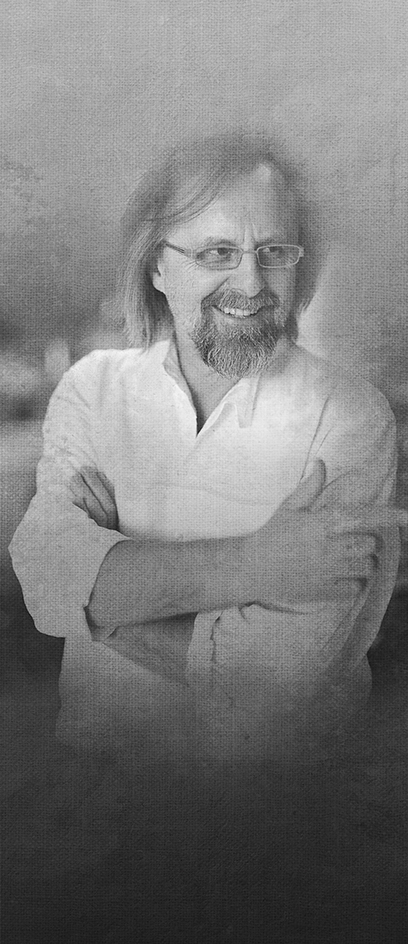
Jan A.P. Kaczmarek
kompozytor, autor muzyki filmowej i teatralnej, laureat Oscara w 2005 r. za muzykę do filmu Marzyciel
(ur. 29.04.1953 r. w Koninie)
Napisać muzykę to jedno, ale żeby naprawdę działała trzeba fantastycznie ją wykonać – Jan A.P. Kaczmarek w wywiadzie z 2004 r.
Jan A.P. Kaczmarek to obecnie jeden z najbardziej cenionych kompozytorów muzyki filmowej na świecie. Chociaż na co dzień mieszka w Los Angeles, współpracując z wieloma hollywoodzkimi reżyserami, jego zawrotna kariera rozpoczęła się lata temu w Polsce.
Większość wczesnego życia muzyka była związana z Poznaniem. To tutaj studiował prawo, marząc o karierze dyplomaty. PRL-owska rzeczywistość zweryfikowała plany młodzieńca, który zorientował się, że w polityce nie ma dla niego miejsca. Postawił więc na muzykę. Wydawało się to wyborem naturalnym – Kaczmarek pochodził bowiem z wyjątkowo umuzykalnionej rodziny. Jego dziadek był skrzypkiem, a matka entuzjastką poznańskiej filharmonii. Przyszły kompozytor uczęszczał jako dziecko na lekcje fortepianu oraz komponował utwory muzyczne do przedstawień szkolnych.
Początki profesjonalnej kariery muzycznej Kaczmarka miały związek z teatrem. W latach siedemdziesiątych odbył staż w awangardowym Teatrze Laboratorium, a następnie podjął pracę w zaangażowanym politycznie Teatrze Ósmego Dnia, gdzie udało mu się stworzyć własną Orkiestrę Ósmego Dnia.
Kolejnym krokiem był podbój scen zagranicznych. W 1982 r. Kaczmarek wyruszył ze swoją grupą muzyków w tournée po Stanach Zjednoczonych, gdzie nagrał debiutancki album Music For The End dla niezależnej wytwórni Flying Fish Records z Chicago. Kolejne kilka lat to pasmo sukcesów, zapewniające kompozytorowi międzynarodową sławę. Aby w pełni rozwinąć swoją karierę, w 1989 r. Kaczmarek zdecydował się na stały pobyt w Los Angeles.
Lata dziewięćdziesiąte zapoczątkowują szczególnie płodny okres w twórczości muzycznej Jana Kaczmarka. Pracuje on dla czołowych teatrów amerykańskich oraz jest nagradzany wieloma prestiżowymi wyróżnieniami, m.in. nagrodą Drama Desk przyznaną przez nowojorskich krytyków za najlepszą muzykę teatralną roku do spektaklu Joanne Akalaitis Tis Pity She’s a Whore z 1992 r.
Jeszcze większe triumfy święci Kaczmarek na polu muzyki filmowej. W sumie skomponował ścieżki dźwiękowe do ponad 50 filmów długometrażowych i dokumentalnych, takich jak: Niewierna Adriana Lyne’a, Plac Waszyngtona Agnieszki Holland, Stracone dusze Janusza Kamińskiego, Quo vadis Jerzego Kawalerowicza czy Marzyciel Marca Forstera. Za muzykę do ostatniego z tych filmów, w 2005 r. kompozytor otrzymał nagrodę Oscara oraz nominację do Złotych Globów i nagrody BAFTA.
Czy wiesz, że… ?
- Jan Kaczmarek jest wirtuozem gry dwoma smyczkami na tzw. fidoli Fischera – strunowym instrumencie podobnym do cytry. W 1983 r. Kaczmarek zaprojektował własny instrument na bazie fidoli o nazwie niewkacz.
- Kompozytor nagrywa płyty dla wielu renomowanych wytwórni muzycznych, m.in. Sony Classical, Decca, EMI i Savitor Records.
- Kaczmarek regularnie koncertuje w USA i Europie. Jest również członkiem amerykańskiej i europejskiej Akademii Filmowej.
- W 2004 r. Jan A.P. Kaczmarek założył Instytut Rozbitek, pomyślany jako miejsce spotkań roboczych przedstawicieli filmu, muzyki i teatru, promujące wolność artystyczną i kulturalną działalność edukacyjną.
- Inną inicjatywą Kaczmarka jest Transatlantyk Festival – międzynarodowy festiwal muzyki i filmu odbywający się w Polsce od 2011 r.






